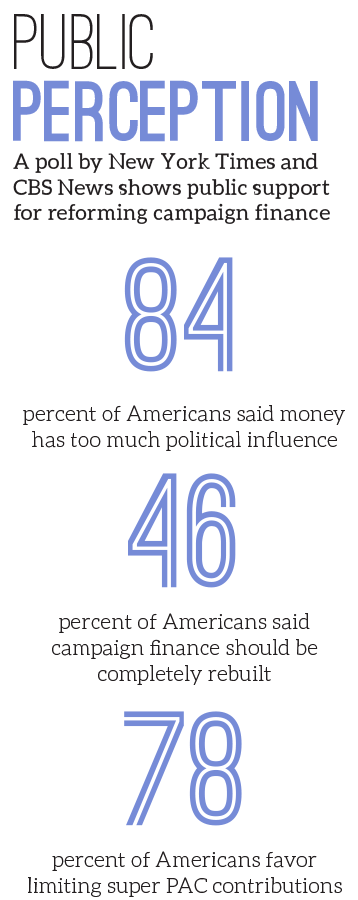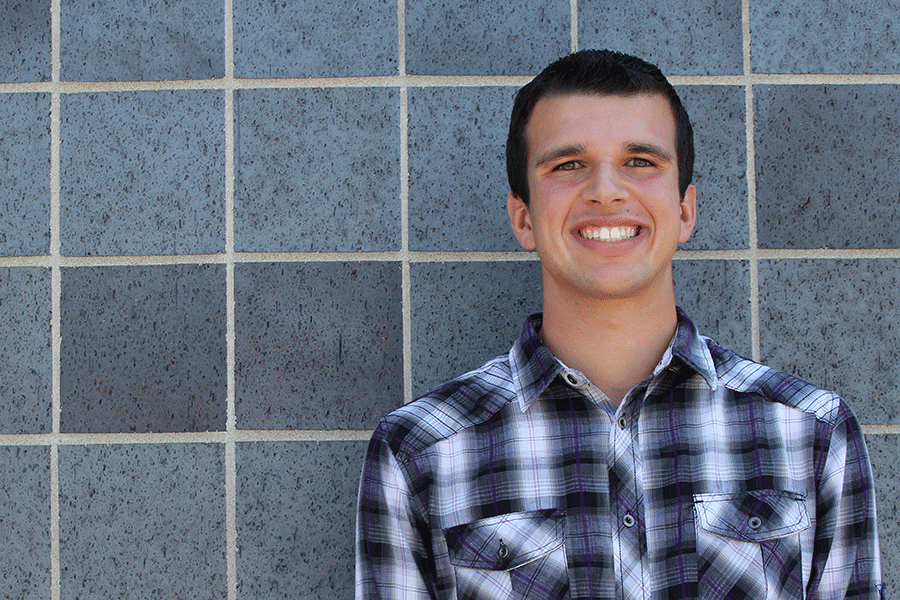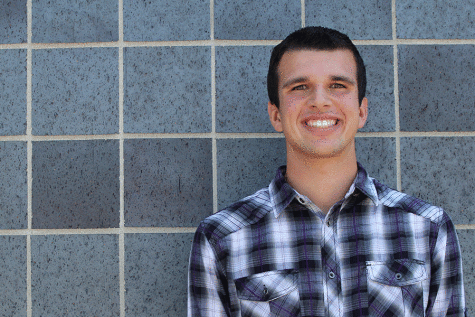Campaign finance reform is the most important political issue
Politicians need to prioritize reforming campaign finance over all other issues in this election
November 18, 2015
We’ve all heard of the one percent — this proverbial class of people that has more money than anyone could ever dream of. However, people don’t often talk about the top one percent of the one percent, even though that’s the most politically influential class of people in the U.S. In a country that prides itself on having a representative democracy, that shouldn’t be the case. The U.S. needs to reform its campaign finance system to get rid of this unfair political influence.
According to Sunlight Foundation, over a fourth of all campaign donations made during the 2012 election were from the top one percent of the one percent — amounting to nearly $1.7 billion from just over 31,000 donors. The median donation from this group was just over $26,500, and every winning congressperson in 2012 received a donation from one of these donors.
But, what’s the issue? Simply put, the current campaign finance system isn’t fair. Sunlight Foundation found that four of every five top donors gave exclusively to one political party. Not only that, but Republican front-runner Donald Trump said in a CBS debate that when he needs a favor from a candidate he’s donated to, “I call, they are there for me.” That isn’t democracy — that’s aristocracy, rule by the wealthy class.
Only one presidential candidate, Harvard law professor Lawrence Lessig, made it a top priority to reform campaign finance, but he recently dropped out of the race. In his campaign, Lessig promised to work toward passing the Citizens Equality Act — a package of laws which would reform the campaign finance system, among other things — before anything else. When I heard about Lessig and the Citizens Equality Act, I actually became slightly hopeful for the plight of campaign finance reform.
 The Citizen Equality Act’s campaign finance reform section basically aims to end elections bought by the wealthy by making elections funded by citizens. It would give voters vouchers that they can use to finance political campaigns that they support, and would match those donations. Also, it would limit the amount of influence lobbyists are allowed to have upon those in Congress.
The Citizen Equality Act’s campaign finance reform section basically aims to end elections bought by the wealthy by making elections funded by citizens. It would give voters vouchers that they can use to finance political campaigns that they support, and would match those donations. Also, it would limit the amount of influence lobbyists are allowed to have upon those in Congress.
One area the Citizens Equality Act doesn’t explicitly cover, though, is overturning Citizens United v. Federal Election Commission. This Supreme Court decision ruled corporations and unions have a constitutional right to spend unlimited amounts of money in political campaigns, spurring the rise of political action committees known as super PACs that receive money from these groups and use the money toward campaigns. This further gives the one percent of the one percent, many of whom own major corporations, unfair political influences. If there were a move to citizen-funded elections, though, it’s somewhat implied that super PACs wouldn’t exist anymore.
With the Citizens Equality Act, everyone in the U.S. would an equal amount of financial influence in political races. Politicians wouldn’t be forced to follow the demands of the billionaire class, and, instead, elected officials could actually represent the views of the majority — like how a representative democracy is supposed to work.
Now that Lessig is out of the race, campaign finance reform seems to be on the backburner as an issue for the few candidates that even talk about it. So, more presidential candidates need to make the Citizens Equality Act, or other campaign finance reform packages, their top policy priorities.
It’s not that easy, though. Nearly every candidate on either side of the aisle has a super PAC, and that’s usually a main source of campaigning. For any to fully support campaign finance reform, he or she would have to give up any super PACs to actually seem genuine. And, when a majority of the field relies on super PACs to campaign, giving up one might kill a campaign.
There are a few candidates, though, who could convincingly take up campaign finance reform as a top issue. On the Democratic side, Senator Bernie Sanders has already talked a lot about reforming the campaign finance system, overturning Citizens United in particular. He’s the only Democratic candidate without a super PAC — now, he just needs to take up citizen-funded elections and put the issue before anything else.
On the Republican side, Trump makes perfect sense. He’s already spoken out about what’s wrong with having billionaires give exorbitant donations to politicians, and he doesn’t need to rely on a super PAC — he even said so — because he’s “really rich.” Now, he just needs to turn his talk into policy, and prioritize it in his campaign.
As long as a few candidates prioritize campaign finance reform, the issue could actually get somewhere. From there, they put pressure on other candidates to push for a solution to the issue and convince those in Congress to support a solution.
I look forward to voting in the 2016 presidential election for the first time. However, I look forward to voting for someone who I am confident can actually pass the reforms promised in his or her campaign. Unless we reform campaign finance and allow elected officials to represent those who elected them instead of one percent of the one percent, I don’t see how that can happen.










